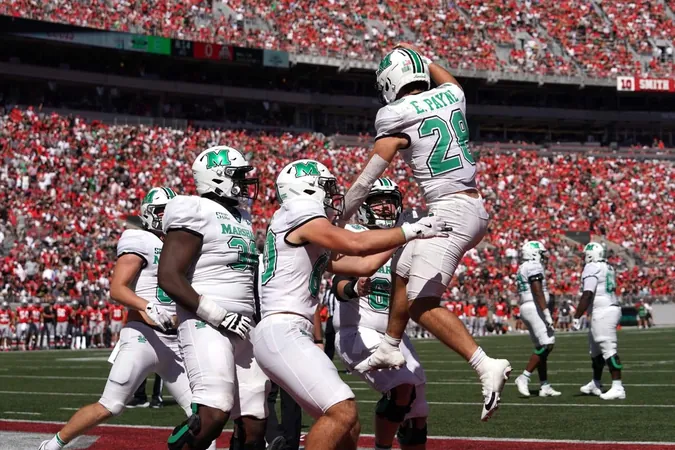
Marshall Withdraws from Independence Bowl: Consequences Loom as Transfer Portal Impact Deepens
2024-12-16
Author: Kai
Marshall Withdraws from Independence Bowl
In a surprising turn of events, Marshall University announced its withdrawal from the Independence Bowl against Army, leading American Athletic Conference Commissioner Tim Pernetti to suggest potential penalties for schools that renege on bowl game commitments. The decision came after over 20 Marshall players opted out to enter the transfer portal, a trend that has sparked increasing concern within college football.
The Shift in Matchup
Originally set to face Army, who boasts an impressive 11-2 record this season, Marshall's decision to pull out opened the door for Louisiana Tech (5-7) to take their place on December 28 in Shreveport, Louisiana. The abrupt abandonment of the game has not only disappointed fans but also raised serious questions about the integrity and future of bowl games, as highlighted by Nick Carparelli, executive director of Bowl Season. He expressed disappointment in Marshall's choice, indicating that there were still enough available players to form a competitive team.
Coaching Changes and Their Consequences
Adding to the drama, Marshall's athletic department experienced significant upheaval when head coach Charles Huff departed for Southern Mississippi just one day after the team secured the Sun Belt championship. This shift, combined with the timing of the transfer portal window opening after championship games, exacerbated the team's player exodus.
Calls for Accountability in Bowl Commitments
Pernetti noted the pressing need for colleges to reconsider their commitments to bowl games if they anticipate difficulties in assembling a full roster. He proposed legislation that would hold programs accountable for their bowl game commitments, urging that any school that accepts a bowl invitation should be required to play— or face penalties that impact opposing teams.
The Future of College Football
Both officials and stakeholders agree that the current transfer portal system, which allows players to switch schools immediately, places undue pressure on athletes. Carparelli recommended delaying the portal's opening until after a significant portion of bowl games are completed, arguing that many players still aspire to compete and desire to play.
Implications on the Academic Progress Rate (APR)
The implications of Marshall's exit are significant not just for the team but for the landscape of college football as a whole. With the Academic Progress Rate (APR) being the deciding factor for bowl invitations, the reliance on this system has proven problematic, especially when teams like Louisiana Tech find themselves scrambling to fill the void left by a withdrawing team.
Looking Ahead to Bowl Season
As we head deeper into the bowl season, the eyes of college football fans and administrators alike will be on how the sport navigates these new challenges, as well as the ramifications of player mobility and coaching changes. The case of Marshall will likely serve as a pivotal moment in the ongoing discussion about the future of college football and the integrity of its postseason. Stay tuned for more developments in this evolving story!

 Brasil (PT)
Brasil (PT)
 Canada (EN)
Canada (EN)
 Chile (ES)
Chile (ES)
 España (ES)
España (ES)
 France (FR)
France (FR)
 Hong Kong (EN)
Hong Kong (EN)
 Italia (IT)
Italia (IT)
 日本 (JA)
日本 (JA)
 Magyarország (HU)
Magyarország (HU)
 Norge (NO)
Norge (NO)
 Polska (PL)
Polska (PL)
 Schweiz (DE)
Schweiz (DE)
 Singapore (EN)
Singapore (EN)
 Sverige (SV)
Sverige (SV)
 Suomi (FI)
Suomi (FI)
 Türkiye (TR)
Türkiye (TR)